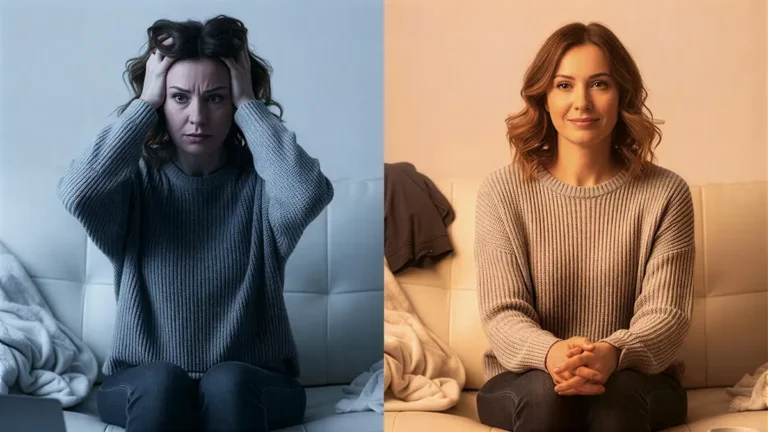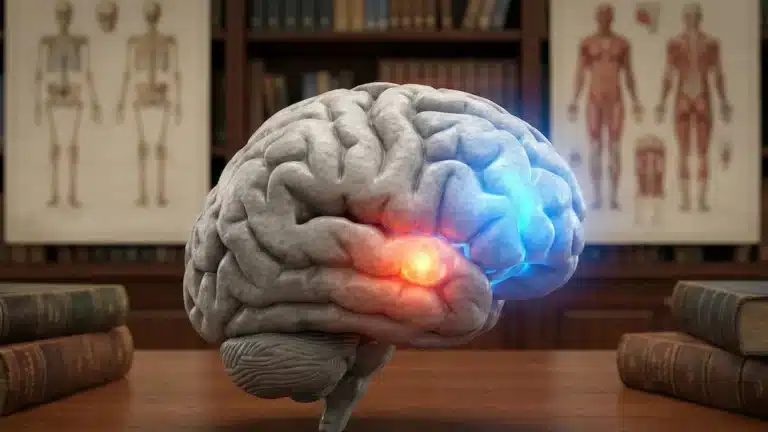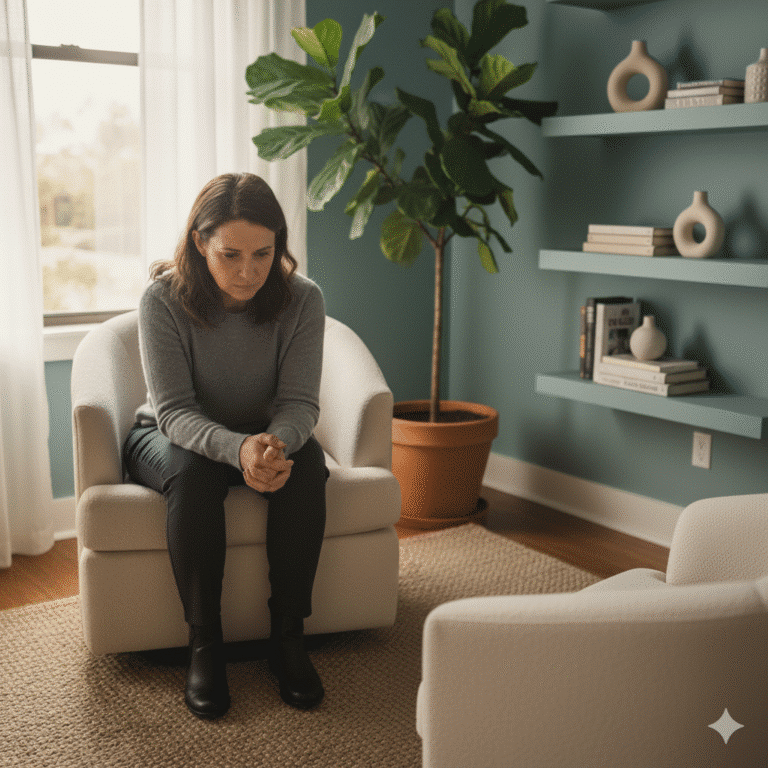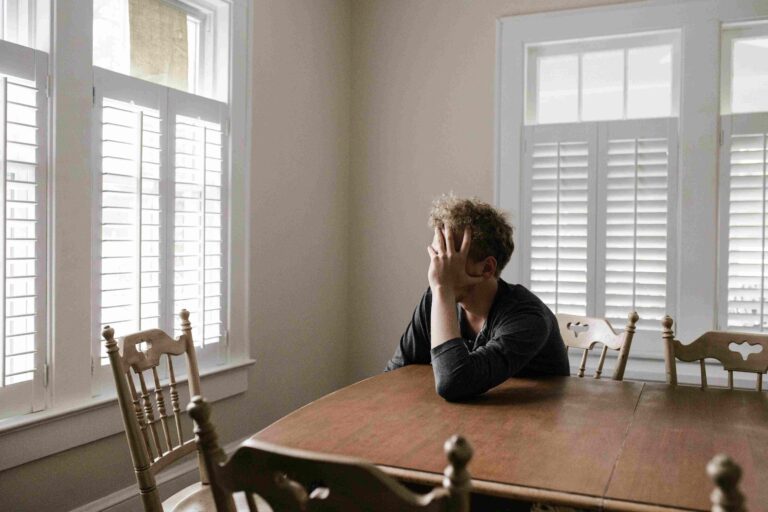3 Reassons You Can’t Sleep At Night – Anxious Afterhours
Imagine, you had a great day at work, maybe a good dinner out with friends, a brisk walk in the summer heat, all seems well. But when you go to lay down for bed the feeling of impending doom sets in. Your thoughts are racing between what catastrophic event might occur and that one embarrassing thing you did back in the 8th grade. And let’s be honest, there are probably a hundred other anxious thoughts swirling in there, and all you want to do is sleep after a good day. You are not alone. There are many people in the world that deal with nighttime worry.
So many of us have dealt with this, some for a short time and others for a long time. Some of us will deal with it temporarily based on stress and for others this is a common occurrence throughout their lifetime. Nighttime worry is ultimately no different than daytime worry. The only difference you ask? The quiet, dark, and unoccupied mind. Nighttime worry can run rampant without distraction. And then our worry about nighttime worry suddenly feeds out nighttime worry. It is a vicious cycle. Let’s talk about it.
Why Does Anxiety Occur at Night?
1. The Perfect Storm for Worry
Going to bed can be a breeding ground for anxiety due to environmental and psychological factors. During the day, we have things constantly vying for our attention, our coworkers or peers, our phones and computers, nature, and so much more. But at night all of that slowly dissipates. The silence and ease in the brain creates the space needed for the anxious thoughts to begin swirling. Without outside stimuli and interruption, the swirling thoughts begin to create a tornado in the brain. Soon we can barely track our thoughts but when we do, we are catastrophizing and focusing on so many negative things that have happened or might happen in the future. It so easily consumes us in the silence of the night.
This shift happens because your brain naturally processes the day’s events during quiet moments. However, for people prone to anxiety, this processing time becomes hyperactive, turning reflection into rumination and concern into panic.
2. The Physiology Behind Nighttime Anxiety
The circadian rhythm is the body’s internal clock. It works to tell us when it is time to sleep by changing the chemicals in the brain. One chemical, cortisol, is very important in understanding nighttime anxiety. In a person without anxiety, cortisol peaks in the morning and lowers throughout the day to make space for melatonin production. Melatonin is the chemical that tells us, “night-night”. But, when anxiety plays a role during the day, the cortisol levels increase at the wrong time, and this can cause your body to still be alert and looking for danger when melatonin should be kicking in. So, your mind knows it is bedtime but your body is alert. This can create yet another storm leading to nighttime anxiety.
3. Nighttime Anxiety Symptoms
Nighttime symptoms often present in both mental and physical ways and can vary in intensity and duration. Some people will experience more mental or more physical symptoms. Every person is unique.
Mental Symptoms of Anxiety
Racing thoughts are quite common with nighttime anxiety. Your brain will jump from one thing to the next and sometimes the anxious thoughts just get worse and worse. You can barely keep track of your thoughts because they move so fast. Sometimes they are thoughts about the past and sometimes they are about the potential future but either way you can’t get in the moment to go to sleep and stop the race in your brain.
Catastrophic thinking is when you think of only the worst-case scenarios. So often we will take a small negative experience and catastrophize it by taking it to the next level. Maybe you got a C on a paper in school and now you are lying in bed convinced you will fail out of college and never succeed again. And suddenly, you are overwhelmed by everything, ultimately feeding your nighttime anxiety.
Rumination occurs when you are stuck thinking about the same issue over and over again. You will analyze and pick apart every aspect of the given situation. Maybe it was a conversation with a peer or your roommate that could have gone better. You think about how you perceive the conversation, how the other person may have perceived it, how you could change it, what you could do better, how embarrassing it was to not have been perfect in the interaction. With rumination, the list could go on for days.
Just like your daytime anxiety, nighttime anxiety comes with a host of physical symptoms as well. Heart palpitations and a racing heart often come with anxious thoughts and sometimes they come before the anxious thoughts are conscious thoughts.
Muscle tension caused by anxiety can make getting comfortable difficult. This can add stress by giving space for your anxious thoughts to slide in because you can’t quite fall asleep in that position.
Difficulty breathing, like shallow breathing or feeling short of breath, can create a panic that feeds anxiety faster than most symptoms. It feels hard to breathe and now your catastrophizing thoughts feel like they are all about to come true. You were right all along.
Digestive issues are extremely common with daytime and nighttime anxiety. Many report nausea, the feeling of knots in the stomach, and the sudden need to use the bathroom. The anxiety in the brain directly impacts digestive functions through the gut-brain connection. This symptom is often a response to ongoing anxiety but can also cause anxiety to begin or worsen.
Coping Strategies for Immediate Relief
When anxiety strikes at bedtime, you need quick strategies to interrupt the spiral and create space for sleep.
4-7-8 breathing can provide immediate relief through activating your parasympathetic nervous system. Inhale through your nose for 4 seconds, hold for 7 seconds, and exhale through your mouth for 8 seconds. Increasing your exhale to longer than your inhale is very important in this exercise. Some people struggle to hold for 7 and exhale for 8, so tailor this to your ability rather than causing anxiety about your performance or breathing. If you can do 4-4-5, that will help.
Progressive muscle relaxation releases tension in your body and gives your brain a task to focus on. Identify different areas of your body, tense the muscles in that area for 5 seconds and release the tension. Think about how it feels to both feel tense and after releasing tension. Start with your toes and move up the body to the top of your head. Sometimes this works so well you will fall asleep before you are done. Don’t fret, that’s the goal.
The 5-4-3-2-1 grounding technique pulls your focus into the present moment. It grounds your thinking into the here and now. Start by identifying 5 things you can see, 4 things you can touch, 3 things you can hear, 2 things you can smell, and 1 thing you can taste. Try to really stay in your present moment and identify the things in the area but venture out if you can’t find things.
Coping Strategies for Long-Term Relief
It is important to address your anxiety as a whole. Addressing the immediate symptoms of nighttime worry is important but can only do so much without addressing your anxiety as a whole.
A great way to address anxiety build up is to schedule your worry time. Take 15-20 minutes a day to let your anxious thoughts take over. Set an alarm and let it run. Once the alarm goes off, everything gets put away until tomorrow’s worry time. It is important to remember this will not work for everyone and that is okay. If you try it and it doesn’t help or it makes things worse, take a look at some of the other options.
Getting regular exercise can change the game for your anxiety. Exercising not only produces feel good chemicals in the brain but also metabolizes stress hormones. Although it is important to time your exercise. Any vigorous exercise should be completed at least 3 hours before bedtime. A calm walk or light yoga practice before bed can be helpful though.
Mindfulness meditation rewires your brain’s response to anxious thoughts. Taking time, daily, to engage in mediation can help you better deal with anxious thoughts in the moment. Meditation gives you the space needed to allow anxiety to be just thoughts rather than all consuming experiences.
Cognitive behavioral therapy (CBT) can help address root causes of anxiety and teach you how to challenge your anxious thoughts. Over time this practice can help weaken the connection between triggers and anxious thoughts, ultimately reducing your nighttime anxiety.
Sleep Hygiene
Creating good sleep conditions helps you fall asleep faster and interrupts anxiety’s chance to interfere with sleep.
It is best that your bedroom is dark, quiet, and cool. You want minimal lights shining in your room, use black-out curtains when possible, and white noise machines or earplugs can help too.
Creating a consistent bedtime routine can do wonders for your nighttime anxiety. Doing this trains your brain, and the chemicals in it, when to prepare for bed. It is most effective if you go to bed at the same time every night after doing the same activity every night. This could be taking a warm bath, reading a book, or listening to calm music or a podcast.
Another way to improve sleep hygiene is to maintain that your bedroom is for sleep and relaxation only. It can confuse your brain when you use your bed for studying, working, or watching tv. We want the brain to see the bed and associate it will relaxation and sleep.
When to Seek Professional Help
It is important to notice when the normal, occasional nighttime anxiety becomes persistent and interferes with sleep quality or daytime functioning. If this happens, it may be time to seek professional help.
If your nighttime anxiety occurs more than 3 nights per week, consistently for several weeks and is impacting sleep quality or causes you to avoid bedtime, it may be time to ask for help. It may also be time to ask for professional help if your anxiety goes beyond nighttime anxiety, if you are dealing with anxiety all day and at nighttime, help is available.
Therapists specializing in anxiety disorders can provide cognitive behavioral therapy, exposure therapy, or other evidence-based treatments tailored to your specific triggers and symptoms. These interventions often prove more effective than self-help strategies alone for persistent anxiety.
There are medications available for anxiety. Medications, while not for everyone, can be a great intervention to help you find the space needed to begin conquering your anxious thoughts. Psychiatrists and psychiatric nurse practitioners are able to prescribe medications based on your individual needs.
Finding Your Path to Peaceful Nights
Nighttime anxiety does not have to control your evenings. Taking time to understand the factors behind your worry can help you best learn to address it. Whether you need immediate relief or long-term solutions to ongoing anxiety, consistently practicing the techniques mentioned above can help you better manage your nighttime anxiety. When getting started, go with one or two interventions first. Don’t overwhelm yourself with multiple interventions. Take your time and give the interventions time to work. These probably won’t solve all your problems the first time but over time, as you learn them more and more, the interventions will become second nature.
It is important that you know you are not alone in this. Try the interventions above, and if you are still struggling with consistent nighttime anxiety, please don’t hesitate to ask for professional help. You deserve peace.
FAQs
Can anxiety cause high blood pressure?
Yes, anxiety can cause your blood pressure to increase but this is typically temporary and usually subsides with a decrease in anxiety. Chronic anxiety can cause strain on the heart which increases risk for high blood pressure for some.
Will anxiety go away?
It can. For some, anxiety will resolve on it’s own, for others it may resolve with treatment, but for others it will persist long-term. Treating anxiety is the best way to manage it and even if treatment does not fully stop your anxiety, it can reduce it to a level in which you are better able to function.
Which anxiety medication is best?
This is a great question for your medication provider as they will better answer this based on your specific needs. The medications typically used for anxiety include:
– SSRIs
– SNRIS
– Benzodiazepines
– Buspirone
– Other antidepressants
Are anxiety medications addictive?
Some anxiety medications, like benzodiazepines, have a risk of dependance. If you have concerns with addiction, please relay these concerns to your medication provider as you discuss best interventions for your anxiety.
Is it normal to have anxiety?
Yes, anxiety is a normal reaction to stressful situations. Anxiety can help motivate and protect us in life. Some anxiety is normal but if it affects your ability to function, it may be worth asking for help.







